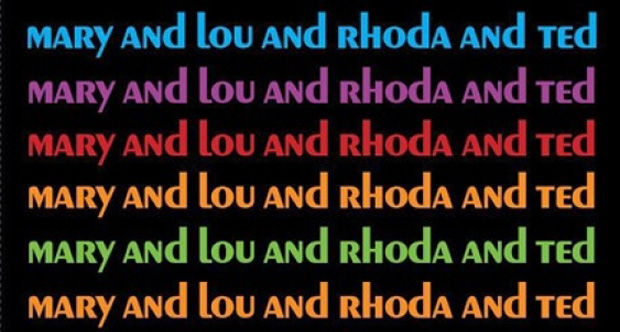 Treva Silverman is an Emmy winning television writer known for her work on The Mary Tyler Moore Show. You can find more information on Mary and Lou and Rhoda and Ted here and here.
Treva Silverman is an Emmy winning television writer known for her work on The Mary Tyler Moore Show. You can find more information on Mary and Lou and Rhoda and Ted here and here.
Excerpt from MARY AND LOU AND RHODA AND TED by Jennifer Keishin Armstrong
Introduction: Comedy and the Single Girl
Treva Silverman had always wanted to be the beautiful, funny, smart heroine of a 1930s screwball comedy. In that world, the woman bantered with the man; the woman was independent, sexy, desirable, witty. Idiosyncratic actresses like Jean Arthur, Carole Lombard, Rosalind Russell, Claudette Colbert, and Margaret Sullavan were the leading ladies there. Unfortunately, in the 1950s, when Treva was a twelve-year-old in Cedarhurst, Long Island–the time when this desire took hold of her–the movie world had moved on from fast-talking comediennes to man-pleasing models of femininity like Doris Day, who seemed to have endless hang-ups about being good and pure, and Marilyn Monroe, who was the quintessential dumb blonde. The idea of an equal partnership between equally bright men and women trading quips had all but disappeared from films. And TV was even worse: Father Knows Best and The Donna Reed Show featured “dialogue” in which the woman’s only role was to say, “Yes, dear.” The most popular TV comedy heroine was Lucy, who wanted to be in show business but had to hide it from Ricky, who didn’t approve. The central joke of the show hinged on the fact that male approval ruled.
Magazines bombarded Treva with advice to young women–talk about his interests, don’t be competitive, learn how to make his favorite meals. To get the guy, she learned, she had to be all about him. At hergrammar school, PS #3, her girlfriends chastised her for winning a spelling bee over Jerry Yaeger, the very boy she had a crush on. She’d never have a chance with him now, they lamented.
So Treva would settle for sitting next to her older sister, Corinne, in the moth-eaten seats of her neighborhood’s only revival movie house, watching and listening to her idols, Jean Arthur and Carole Lombard. Jean Arthur, in her day, made a name for herself as a funny leading lady in the Frank Capra films Mr. Deeds Goes to Town, Mr. Smith Goes to Washington, and You Can’t Take It with You. Lombard was once described by Graham Greene as “platinum blonde, with a heart-shaped face, delicate, impish features, and a figure made to be swathed in silver lame, [who] wriggled expressively through such classics of hysteria as Twentieth Century and My Man Godfrey.” When Treva watched Jean Arthur and Carole Lombard, she wanted to soak up every last bit of them, the way her movie-house popcorn soaked up melted butter.
Treva had one other escape route from suburban ennui: Every week, she took the train from her family’s home in Cedarhurst for more than an hour to get to New York City. It was where she belonged, she was sure. For now, though, she’d settle for going there weekly for her piano lessons at Columbia University. Two officials at the Juilliard School had declared her a “genius” at age five. She had perfect pitch and could play almost any piece by ear after hearing it once; she could transpose into any key. A unique talent, to be sure. But besides her music, something else was becoming a passion.
After her piano lesson every week, she’d race down to the New York Public Library in midtown Manhattan to read her way through the vast stacks of the humor section, in alphabetical order: Robert Benchley, Dorothy Parker, S. J. Perelman, James Thurber. There, at the Forty-second Street library, she had found her people: the humor writers for the New Yorker. Along with some journalists, critics, and actors, they had met daily throughout the ’20s for lunches at the Algonquin Hotel, forming a loose camaraderie called the Algonquin Round Table.
They were known for their sharp witticisms and one-liners, which were quoted all over the newspaper columns. More importantly, the Algonquin Round Table consisted of men and–yes!–women. Not only Dorothy Parker, one of the wittiest of them all, but also Edna Ferber, Tallulah Bankhead, and Beatrice Kaufman.
Treva read on and on, as afternoon turned into dusk, the shadows cast by the library’s stone lions growing longer until they dissolved. She wished she could travel back to the days of the Algonquin Round Table, overhearing them from a neighboring table, or, even better, somehow getting a seat at that table.
From MARY AND LOU AND RHODA AND TED by Jennifer Keishin Armstrong. Copyright 2013 by Jennifer Armstrong. Excerpted with permission of Simon & Schuster, a Division of Simon & Schuster, Inc.
_________________________________
Jennifer Keishin Armstrong grew up in Chicago, then escaped to New York to live in a succession of very small apartments and write about pop culture. In the process, she became a feminist, a Buddhist, and the singer/guitarist in an amateur rock band. She also spent a decade on staff at Entertainment Weekly, cofounded SexyFeminist.com, and now writes for several publications, including Women’s Health, O, Writer’s Digest, Fast Company, and New York’s Vulture. Her history of The Mary Tyler Moore Show, Mary and Lou and Rhoda and Ted, was published by Simon & Schuster in May 2013; her collaboration with Heather Wood Rudulph, Sexy Feminism, was published by Houghton Mifflin Harcourt in March 2013. She has provided pop culture commentary for CNN, VH1, A&E, and ABC. She teaches for Gotham Writers Workshop and at writers’ conferences. Contact her here, or follow her on Twitter: @jmkarmstrong







